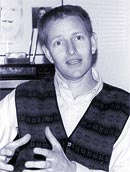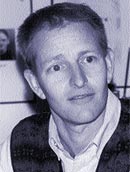|
|
Casey Sterr: “What you give you get back a hundredfold. It’s not a “ministering to”; it’s a “walking with.” Catholic New World photos/Sandy Bertog
Serving—and learning from—the elderly
|
|
|
|
|
|
THE INTERVIEW a regular feature of The Catholic New World, is an in-depth conversation with a person whose words, actions or ideas affect today’s Catholic. It may be affirming of faith or confrontational. But it will always be stimulating.
|
|
Catholic New World staff writer Michelle Martin talks with a volunteer seminarian working with the elderly.
Casey Sterr, 37, is a Maryknoll seminarian at Catholic Theological Union. Before entering the seminary, he spent 10 years working as a fundraiser for not-for-profit organizations. This year, he’s been getting more personal experience, volunteering as an intern with Little Brothers of the Poor-Friends of the Elderly. Little Brothers tries to relieve isolation and loneliness among older people, relying on volunteers to bring caring and compassion into the lives of its clients.
The Catholic New World: Why did you decide to intern at Little Brothers of the Poor-Friends of the Elderly?
Casey Sterr: As part of the program at CTU, we’re asked to volunteer or intern. One of my goals was to work with people where I would establish a relationship where I would visit them more than just once a month or come in and see them for 15 minutes. I wanted to develop a long-term relationship over many months, to build up trust and to be able to know them better. Also, I had visited elderly people before but I had never worked intensively with the elderly, and in preparing for ministry, I was trying to get more experiences, and I liked the program Little Brothers has.
TCNW: When you work for Little Brothers, what do you do?
CS: I think the easiest way to describe it is just simple presence. That’s what I think of it as. It’s going to the people’s homes, and simply being there and listening to them. And by listening to them, I’m able to pick up some of the things they’re interested in doing. For instance, one of my elderly, Roger, he would always talk about his pets, so I asked him, “Do you have any pets now?” and that led to, “Well, no, they’re all buried in a pet cemetery.” So I said to him, “Well, when’s the last time you’ve been to the pet cemetery?” and he said probably four or five years ago, so I said, “Well, I have a car that I can use. Why don’t I take you to the pet cemetery?”
When I got him there, he was overcome with emotion several times. It was kind of an experience for him to reconnect with something that’s important to him, and I was just happy to be a part of that.
Most of the people that I visit with, I try to spend at least two hours each time. That’s why I like not having a lot of people. I can develop more of a relationship instead of just trying to get to everybody.
TCNW: How many people do you visit with?
CS: I visit with five people, and each of the five people has different needs. One of the women said, “I just want you to visit once a month. That’s all I need because I have other people.” She lives in a high-rise.
With Roger, he was very willing right away to just get in the car and go wherever we wanted to go, but one of the women, she was a little slower, had to build a little trust, so I tried to make a few phone calls to her rather than just showing up. That seemed to work well, and eventually I’m supposed to take her to the doctor and shopping. So I’m trying to listen to each person’s individual story.
Another example is I took a woman shopping. When I go shopping—something I don’t like to do—it’s 20 minutes and I go in knowing exactly what I want to get and where it is and then I move on to the next thing. I went with her, and it turned out to be a three-hour shopping trip. She spent maybe $100, got maybe a basketful—not a lot of stuff. There were times when she’d actually push the cart, and I’d want to pull the cart, like, “Let’s get moving a little,” but I realized that for her, it was a community event—seeing her friends and checking out the price of everything but what she wants to buy. For me, it’s a learning experience. I had to learn to not look at what I wanted, but what she wanted and what she needed.
TCNW: You’ve never really worked with elderly people before. What has surprised you?
CS: I don’t know if it surprised me, but it’s been reinforced that the elderly still have a lot to offer. The elderly that I visit want to still be active and are active. They want to get out. They don’t want to sit home.
Some of their memories are amazing to me. I had the stereotype that sometimes their memories are gone, but their memories are very clear. That was a little bit of a surprise to me, how sharp they were.
TCNW: How does your spirituality play into working with the elderly people you visit?
CS: Spirituality without putting some of the fruits of that spirituality into action is, I don’t want to say dead, but it’s not as alive. The whole Gospel message of reaching out beyond ourselves to serve others is part of what we’re called to as Catholic Christians. That model of reaching beyond ourselves just reinforces that spirituality of giving. There are definite parallels.
I’ve learned something about spirituality, but I’ve also learned something about myself. Sometimes maybe I’m challenged with patience when dealing with someone else, and that I need to listen to what they want to do. Those are all things about respecting the other person and caring for the other person and having compassion, some of those spiritual elements. What you give you get back a hundredfold. It’s not a “ministering to”; it’s a “walking with.”
TCNW: It sounds like you’re having fun doing this.
CS: I do have fun. That was one of my goals—they asked us to set out some goals, and one of mine was to have fun doing this.
For more information about Little Brothers-Friends of the Elderly, call (312) 455-1000.
top
Front Page | Digest | Cardinal | Interview
Classifieds | About Us | Write Us | Subscribe | Advertise
Archive | Catholic Sites | New World Publications | Católico | Directory | Site Map
|









